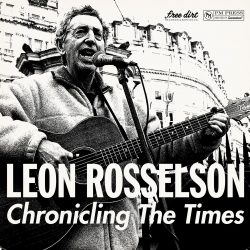Leon Rosselson parcels up some of his favourite tracks from a 60-year recording career and reminds you of his worldview.
 So what can you say about Leon Rosselson? – songwriter, folk singer, writer and serial activist, whether physically or with the written word, national treasure (now nearly 90 years old!), humorist, and satirist. Does his music fall into the genre we know as americana? – hardly. And yet, here we are, with a ‘new’ album, ‘Chronicling the Times’, a selection of some of Rosselson’s own favourite musical outpourings from over 60 years, some re-recorded for the times but most extracted from his various albums in their original form. He has been friends for many years with Martin Carthy, Jimmie McGregor, Roy Bailey and others from the UK folk scene and has extensively influenced the likes of Billy Bragg.
So what can you say about Leon Rosselson? – songwriter, folk singer, writer and serial activist, whether physically or with the written word, national treasure (now nearly 90 years old!), humorist, and satirist. Does his music fall into the genre we know as americana? – hardly. And yet, here we are, with a ‘new’ album, ‘Chronicling the Times’, a selection of some of Rosselson’s own favourite musical outpourings from over 60 years, some re-recorded for the times but most extracted from his various albums in their original form. He has been friends for many years with Martin Carthy, Jimmie McGregor, Roy Bailey and others from the UK folk scene and has extensively influenced the likes of Billy Bragg.
Rosselson was born in North London to Russian émigré parents and began to involve himself in music in the fifties with visits to world youth festivals as part of a choir. He became proficient on acoustic guitar and banjo and by the late 50s, he was a founder member of the folk group the Galliards. In 1964, after the band’s break up he formed The Three City Four, with Martin Carthy. He began to write more satirical songs for his repertoire and was invited to sing them regularly on David Frost’s popular satirical TV show ‘That Was the Week, That Was’. He later started writing children’s books (17 in total) and others for adults including his own memoirs.
Over the years Rosselson has written some of the most biting of songs and his extraordinary lyrical talent is evidenced by the ease of his rhyming couplets and verses of his songs, irrespective of the subject matter. And though he is not known for his singing voice (his style is half singing, half-spoken as in ‘Talking Democracy Blues’, written after the Tory government election in 2010 but very much in the style of 60s Dylan), the songs tend to penetrate the psyche by sheer personality of his interpretation- often with a large dose of humour. Songs about communism, anti-capitalist rhetoric, anti-monarchist observations, anti-government protest (his ‘Ballad of a Spycatcher’ is a damning challenge to the Thatcher Government for their banning of the Peter Wright book ‘Spycatcher’ –“ For Nanny (God bless Nanny) thinks it wouldn’t do for you To know about the naughty things that grown-up people do” – for Nanny read Thatcher!)
Interestingly, Rosselson’s style has never changed, and although musical tastes have changed, and subject matter too, he has never been moved to alter his approach to songwriting or production just for the sake of fashion. As a consequence you could say he has always been in fashion. Asked why he didn’t write pop songs, which his talent would have supported, he asked ‘what would be the point? What can you say in a pop song’? For the most part these tracks feature him on acoustic guitar (on which he is very accomplished) and some tracks are enhanced with the addition of Martin Carthy on guitar, or with friends (the Oyster Band, Roy Bailey on vocals and lead vocal on the rousing closing track ‘Stand Up for Judas’ or Fiz Shapur on keyboards and horns). Special mention of the brilliant Paul Jayasinha on trumpet on the fascinating ‘holiday observations’ (‘Postcards from Cuba’)
It’s impossible to quote from his lyrics (satirical or polemic, even comic or romantic) – every song contains tasty morsels of his scorching wit, so it would take pages. He is without doubt one of the great musical chroniclers of the last 50 years of the world at large and the UK in particular (even casting his lyrical net back to the distant past), and sometimes the fierceness of his observations of the hypocrisy of those in power casts him unerringly as a kind of godfather to the punk rock movement (an observation Billy Bragg noted quite recently). It’s a fascinating listen.


